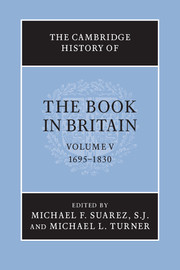Book contents
- Frontmatter
- Introduction
- PART I THE QUANTITY AND NATURE OF PRINTED MATTER
- PART II ECONOMIC, LEGAL AND CULTURAL CONTEXTS
- PART III THE TECHNOLOGIES AND AESTHETICS OF BOOK PRODUCTION
- PART IV THE BOOK TRADE AND ITS MARKETS
- I LONDON AND THE ‘COUNTRY’
- II TWO CASE STUDIES
- III SERIAL PUBLICATION AND THE TRADE
- 20 London newspapers
- 21 Newspapers and the sale of books in the provinces
- 22 British commercial and financial journalism before 1800
- 23 Distribution – the case of William Tayler
- 24 Periodicals and the trade, 1695–1780
- 25 Periodicals and serial publications, 1780–1830
- IV THE INTERNATIONAL MARKET
- V BOOKS AND THEIR READERS
- Abbreviations used in bibliography
- Bibliography
- Index
- Frontispiece
- Plate section
- References
21 - Newspapers and the sale of books in the provinces
from III - SERIAL PUBLICATION AND THE TRADE
Published online by Cambridge University Press: 28 September 2010
- Frontmatter
- Introduction
- PART I THE QUANTITY AND NATURE OF PRINTED MATTER
- PART II ECONOMIC, LEGAL AND CULTURAL CONTEXTS
- PART III THE TECHNOLOGIES AND AESTHETICS OF BOOK PRODUCTION
- PART IV THE BOOK TRADE AND ITS MARKETS
- I LONDON AND THE ‘COUNTRY’
- II TWO CASE STUDIES
- III SERIAL PUBLICATION AND THE TRADE
- 20 London newspapers
- 21 Newspapers and the sale of books in the provinces
- 22 British commercial and financial journalism before 1800
- 23 Distribution – the case of William Tayler
- 24 Periodicals and the trade, 1695–1780
- 25 Periodicals and serial publications, 1780–1830
- IV THE INTERNATIONAL MARKET
- V BOOKS AND THEIR READERS
- Abbreviations used in bibliography
- Bibliography
- Index
- Frontispiece
- Plate section
- References
Summary
Introduction
The provincial newspaper trade was an entirely new development in the eighteenth century, enabled by the lapse of the Printing Acts in 1695. The London printing trade had made a good recovery after the Great Fire and plague in the 1660s and the capital was overcrowded with printers by the end of the century; the regulations that had attempted to control their numbers and restricted book production to London, Oxbridge and York were no longer in force, and some printers began to think of making a fresh start in the country. Often they returned to towns where they already had family or trade connections. The migration of printers from London was evidently anticipated by an increase in the numbers of booksellers and stationers who serviced the provincial reading and writing market. But the economic reality of London’s traditional dominance in book production, supported by networks to distribute books throughout the country, meant that the new provincial printers could not easily compete on that front. Instead they turned at first to jobbing printing or publishing the occasional local sermon or verse, often combining that with the retail sale of London imprints. The more imaginative, looking for a firmer financial base and steadier employment for their presses, perceived a potential market for locally produced newspapers, and the first provincial papers, the Norwich Post and the Bristol Post-boy, were begun soon after the turn of the century.
Communities in the provinces were long accustomed to reading and hearing newspapers read, for London and continental serials, like books, had always been available to subscribers and their families, friends and customers through the post, along the book-trade networks that radiated from the capital and by means of personal agents. Nevertheless, there was a gap to be filled in the provincial market, for the London papers and newsletters were expensive and scarcely addressed local issues, in either their news or advertising. Country newspaper proprietors were able to capitalize on both the ready availability and the expense of the London papers: they subscribed to several at once to mine them for the latest news – a sort of proto-wire service – at the same time as they drew attention to the fact that in a single relatively inexpensive and locally produced paper the country reader could find the best of the London and continental press. A small section of local news, usually presented in a formulaic fashion, might be included, but more important, the advertisement columns in provincial newspapers developed into a medium for local notices as well as for nationwide campaigns.
Keywords
- Type
- Chapter
- Information
- The Cambridge History of the Book in Britain , pp. 434 - 447Publisher: Cambridge University PressPrint publication year: 2009
References
- 5
- Cited by

